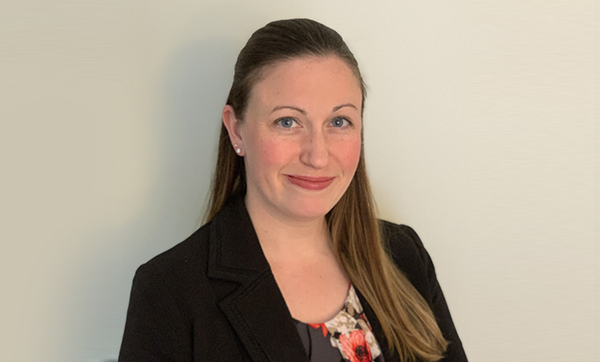Student Enforces COVID-19 Protocols as Health Inspector.

Student Enforces COVID-19 Protocols as Health Inspector
Executive MPH student Camille Griffin ensures that businesses in Framingham, Mass. are adhering to the latest rules on social distancing, mask-wearing, and large gatherings.
“COVID fatigue” is real and it is becoming a growing concern as the US continues to break daily records of diagnosed coronavirus cases, says Camille Griffin.
The full-time executive MPH student at the School of Public Health is also a full-time health inspector for the City of Framingham, Mass. where she conducts coronavirus-related inspections at local businesses, including restaurants, supermarkets, places of worship, recreational facilities, and retail stores.
While most residents abide by the Commonwealth’s safety mandates and guidelines, Griffin says an increasing number of people are becoming weary of practicing social distancing and wearing face coverings in public.
“COVID fatigue is my biggest concern right now,” says Griffin, who has been in a health inspector role for more than three years, along with a team of four other inspectors. “Through our contact tracing in Framingham, we’ve seen that some people are becoming tired of doing what they have done for months. We’re seeing a lot of household transmission, with people letting their guard down and not wearing face coverings—especially in settings they are comfortable with, such as with extended family or friends.”
These challenges energize and motivate Griffin to do her job every day to ensure that businesses are compliant with the latest COVID-19 regulations, and that individuals are abiding by state and municipal safety measures for the collective safety and well-being of the community. Framingham has been a high-risk community for several weeks, averaging a daily rate of 40 new coronavirus cases and a 7-day average positivity rate of 5 percent. The city’s public school system recently switched to remote learning through January 4.
Griffin conducts routine inspections, as well as visit to establishments to investigate complaints of violations from community members. The goal, she says, is to educate and provide guidance to the business owners about heeding mandates and guidelines—not to penalize them.
“We stay up to date with all of the rapidly changing state guidelines, and we also have to be the interpreters of these guidelines, because they’re not easy to read,” Griffin says. “I’m in constant communication with business owners, regardless of whether I am doing an inspection, to discuss these changes and show them how their businesses are impacted. We’re doing a lot more community outreach than what a typical environmental health inspector would do.”
We understand it’s a stressful time for everyone.
She says some businesses still lack even basic protocols, such as completing a COVID-19 plan, screening employees at the start of each shift, and cleaning their spaces at the appropriate frequency based on the size and capacity of the business. “We understand it’s a stressful time for everyone and that the rules are changing on what feels like a daily basis, so we try to work with businesses to make sure they’re in compliance,” Griffin says.
Griffin intended to pursue a master’s degree in industrial hygiene after studying environmental and occupational health at the University of Massachusetts Lowell, but she ended up delaying graduate school when she was hired for the health inspector role in 2017.
“I’m so glad my goals shifted towards public health,” says Griffin, who says an MPH degree more closely aligns with her goal to pursue leadership positions at the local level, and become a director of a municipality in the future. “As a working professional, the online executive MPH program really appealed to me because it meant I wouldn’t have to take a sabbatical to complete my education.”
She’s especially appreciative of the support of her fellow inspectors. “We make sure to remind each other that what we’re doing is making a huge difference, even if it doesn’t feel like we are on certain days,” says Griffin. “I would hate to see what Framingham would be like now without the health department’s efforts over the past year. The end goal is achievable and we will get there.”